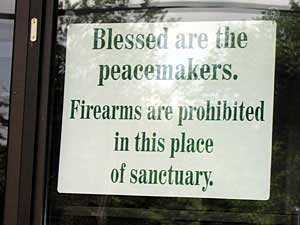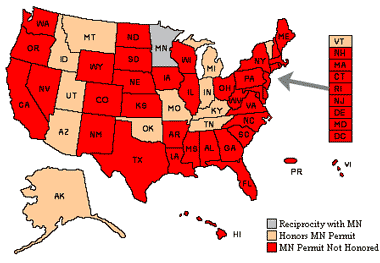|
 St.
Paul (AP) Minnesota's handgun permitting law was declared
unconstitutional Tuesday by a Ramsey County District judge
in a lawsuit brought by several churches and other groups. St.
Paul (AP) Minnesota's handgun permitting law was declared
unconstitutional Tuesday by a Ramsey County District judge
in a lawsuit brought by several churches and other groups.
Judge John Finley said the Legislature
violated the state constitution last year by attaching
the so-called conceal-and-carry bill with a "totally
unrelated bill relating to the Department of Natural Resources."
It is estimated that 30% of Minnesota laws are included
in legislation with unrelated topics.
Attorney Marshall Tanick, who represented
the two original churches in the case, said he expected
the decision to affect the entire state.
"It's a rather sweeping decision,"
he said.
The state constitution prohibits laws
from embracing more than one subject.
"Our state has prided itself in its
openness in all areas of government. ... This basic Minnesota
value is totally frustrated when the Legislature itself
clearly violates the underpinnings of such a basic conscience-guided
law and constitutional provision," Finley wrote in
his opinion.
Lawyers on both sides of the issue were
scrambling Tuesday to determine the immediate impact of
the ruling.
"That's a real good question that
I don't think anyone knows at the moment," said Joe
Olson, a Hamline University Law School professor who is
president of a group called Concealed Carry Reform Now.
He and Gov. Tim Pawlenty both said they
hope the Legislature or state Court of Appeals would reinstate
the new law.
Minnesota Attorney General Michael Hatch
said he would appeal Finley's ruling for several reasons,
including the rigid application of the single-subject
rule in the constitution.
He said the Legislature frequently passes
laws containing unrelated subjects.
"We do need to get some direction
there in terms of what the Legislature should do when
it's debating rules and amendments," Hatch said.
 David
Lillehaug, an attorney who represented several of the
church groups, called the bill "by far the most dramatic"
example of different subjects combined into one bill in
recent years. David
Lillehaug, an attorney who represented several of the
church groups, called the bill "by far the most dramatic"
example of different subjects combined into one bill in
recent years.
"This was uniquely outrageous,"
he said.
In terms of the gun law, Hatch said Tuesday's
ruling would have little effect on handgun permits issued
since the law went into effect. "We believe they
are valid and will continue to be valid until they expire,"
he said.
Otherwise, the state's handgun laws essentially
will revert to what they were before the conceal-and-carry
law was passed. The top law enforcement officer in a given
jurisdiction, usually a police chief or sheriff, once
again has broad discretion to approve or deny pending
applications, he said.
And property owners will no longer need
to post "no guns" signs to have the authority
to keep guns off their property, as they did after the
law was passed, Hatch said.
 More
than 22,000 Minnesotans have received handgun permits
since the law was changed just over a year ago. That's
about twice as many permits as were issued the previous
year, but well short of projections that as many as 90,000
permits would be issued in the first three years of the
new law. More
than 22,000 Minnesotans have received handgun permits
since the law was changed just over a year ago. That's
about twice as many permits as were issued the previous
year, but well short of projections that as many as 90,000
permits would be issued in the first three years of the
new law.
The new law guaranteed a permit to most
adults who receive required training, pay an application
fee and pass a background check, unlike the old system
in which Hatch said top cops had "unbridled discretion"
to deny permits.
Private building owners began posting
signs at public entrances banning handguns. But the law
prevented private establishments from banning firearms
in parking lots.
The church leaders filed their lawsuit
a week before the law went into effect last year, arguing
that it often uses its parking lot and leased buildings
for worship services and that the church should be allowed
to prohibit guns on its property.
Other congregations from different denominations
across the region, as well as nonprofits and the city
of Minneapolis, joined the lawsuit.
John Gordon, who represented some nonprofits,
called the groups behind the lawsuit "heroes."
"These folks have stood up for themselves
and they have stood up for all of us," he said.
Scott Hippert of Family and Children's
Service said Minnesota citizens were safer because of
the decision.
"This ruling is a strong victory
for Minnesota's families, for our children," he said.
Filed last fall in Ramsey County District
Court, the lawsuit also contended the law infringed on
property rights of the church groups and the city by allowing
people with guns to intrude without permission and without
compensation on the property owners.
And the church groups say the law violates
their guarantees of religious freedom, which the judge
agreed with.
Olson said he wasn't surprised by the
ruling, but expected the state Court of Appeals might
issue a stay in the case, meaning the new law would stay
in place while the ruling is appealed.
"This case was destined for the Minnesota
Supreme Court from the beginning," Olson said. "The
faster it gets there, the better."

Bench becomes hot seat for Finley
Jill Burcum, Star Tribune
July 15, 2004
After shooting down Minnesota's new permit-to-carry
gun law Tuesday, Ramsey County District Judge John Finley
found himself in a familiar place: at the center of a
political fray.
This time it has been generated by his
ruling, which garnered headlines and riled gun-rights
advocates in Minnesota and across the nation.
Finley, 64, has a long history of serving
Ramsey County and perhaps is best known for his 26 years
as a county commissioner before he was elected to the
bench in 1996. Both as politician and judge, the St. Paul
native has weathered his share of controversy.
In 1974, he was a strong advocate for
removing the mayor from the Ramsey County Board, ending
a decades-old way of doing business.
In 1976, he was disciplined as a lawyer
for improperly notarizing documents.
In 1998, he was publicly reprimanded by
the Board on Judicial Standards for voting on tax breaks
for himself and a legal client when he was still a county
commissioner.
More recently, he presided over legal
proceedings that generated statewide publicity and scrutiny.
One involved journalist Wally Wakefield, who faced a $200-a-day
fine for not revealing his source for a news story.
Another involved Eugene Andreotti, who
tried to stop the release of sexual harassment complaints
filed against him while Andreotti oversaw the Minnesota
National Guard.
Now Finley has ruled that the 2003 gun
law violated the state Constitution and Minnesota's tradition
of clean government.
On Wednesday, those who know Finley said
he's probably enjoying the brouhaha.
"He's a scrapper," said Vic
Tedesco, a former longtime St. Paul City Council member
who has known Finley for years.
"He's not afraid of controversy.
He's had it all his life," said Hal Norgard, who
served with Finley for 22 years on the Ramsey County Board.
Thoughtful approach
Finley, who declined to provide information
for this article, was one of the longest-serving commissioners
on the County Board, joining it as a 30-year-old newly
minted law school graduate in 1970 and staying for the
next 26 years.
Norgard, like many others, remembers Finley
as a cool head in a debate and as someone who did his
research and thought carefully before making decisions.
"Any of the decisions he ever made,
he put a lot of hard work into them. It wasn't like he
was jumping off a cliff. He spent a lot of time studying
things, I know," he said.
Norgard doesn't recall Finley ever taking
a public position on gun control, though many members
of the County Board did throughout the years.
Ruby Hunt, who served on the County Board
with Finley from 1984 to 1995, also said Finley steered
clear of gun issues.
She said Finley was actually more conservative
than she thought he would be, especially on budget issues,
and remembers him for his "infectious Irish sense
of humor" and politeness at board meetings.
Hunt said board members were surprised
when the tax break allegations surfaced. However, she
said, she wasn't particularly troubled by them.
"I don't think any of the charges
or allegations that came up were of the serious kind of
nature that you read about in other parts of the country,"
she said.
But Finley's colleagues on the bench he
was elected to in 1996 did take note.
After he achieved a lifelong dream of
becoming a judge, Finley's new colleagues in Ramsey County
"had some real strong question marks as to what kind
of judge he'd be," said former Ramsey County Chief
Judge Lawrence Cohen.
But Finley has proved himself in the years
since. "He carries his share and is terribly thoughtful,"
said Cohen, who retired in 2002. "His fellow judges
grew highly respectful of him. I've heard just outstanding
comments from other judges. ... He's a solid judge."
Cohen had harsh words for anyone thinking
that politics drove Finley's legal reasons for nullifying
the gun law.
"Hogwash," he said. "I'd
be willing to mortgage a house and put in the equity to
... the fact that this was not a political decision, that
this was based on what he believed the law would be."
Finley called fair
Ron Maddox, a Finley friend and former
longtime St. Paul City Council member, comes from a family
of police officers, has a permit to carry a gun and says
he believes strongly in exercising his Second Amendment
right to bear arms.
But he wasn't too worked up when he heard
of Finley's decision.
What people need to know about Finley,
Maddox said, is that he's fair and committed to doing
the right thing no matter what.
"He'd rather be a spark than an ember,"
Maddox said. "I guess that's what he's doing here."
The 2003 gun-permit law, often referred
to as the conceal-and-carry law, required county sheriffs
to honor gun-permit requests by all citizens 21 and older
who have undergone safety training and have no other issues
that would make it illegal for them to own a firearm.
The law does not require the weapon to be concealed.
For now, the state will revert to the
system used before the 2003 law went into effect. Minnesotans
can still get permits, but local sheriffs have broad discretion
in deciding who gets a permit.
|